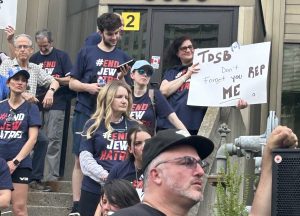 TORONTO — Particularly in the Jewish community, Karl Skorecki, director of medical and research development at Rambam Health Care Campus in Haifa, is known for his groundbreaking studies on kohanim, indicating a common male ancestor among most modern-day Jewish priests.
TORONTO — Particularly in the Jewish community, Karl Skorecki, director of medical and research development at Rambam Health Care Campus in Haifa, is known for his groundbreaking studies on kohanim, indicating a common male ancestor among most modern-day Jewish priests.
Karl Skorecki
As well, he is known for the work of his research team showing that some 3.5 million – 40 per cent – of Ashkenazi Jews are descended from four women who lived in Europe 1,000 years ago.
Skorecki, a professor at the Technion – Israel Institute of Technology, will discuss “The Genetics of Being Jewish” at Beth David B’nai Israel Beth Am Congregation on Oct. 28 in an event co-sponsored by Canadian Friends of Rambam Hospital and the synagogue’s continuing education committee and brotherhood. He will also meet with hospital supporters in Montreal.
In a way, the Toronto talk brings him back to his roots. A native of the city who grew up around the corner from Beth David, he was gold medalist of his medical school class at the University of Toronto in 1977.
Skorecki and his wife Linda and their family made aliyah 14 years ago.
A Harvard University-trained nephrologist with expertise in molecular genetics, Skorecki was the director of nephrology in the department of medicine and pediatrics at the University of Toronto when he left in 1995 to join Rambam and the Technion, with which the hospital is affiliated.
He is currently involved in several endeavours, including stem cell-related cancer research and the genetics of kidney disease. Personalized cancer therapy, still in the research stages, is one of his projects.
Recently there has been “a paradigm shift in trying to understand the management of cancer,” Skorecki said in a telephone interview from his home north of Haifa.
“A lot of people think about eradicating cancer, [but] it may not always be possible to eradicate it completely.”
However, like AIDS, he said, cancer may become “a disease that one can live with for many years, and we are working on that.”
Skorecki, now a 56-year-old father of five and grandfather of 12, decided he wanted to pursue a career in medicine when he was still a teenager at the Community Hebrew Academy of Toronto. “A physician has a great opportunity to… make a contribution to tikkun olam.”
A son of Holocaust survivors, Skorecki – whose 40-page CV lists many professional honours and awards – didn’t imagine when he embarked on his career that part of it would be linked so closely with the Jewish community.
From a medical standpoint, his work has particular implications for the Ashkenazi Jewish community, as well as other populations he has studied, including the Druze.
Like Ashkenazi Jews, the Druze have “a lot of” genetically based diseases, he noted. But unlike Ashkenazi Jews – a larger, more geographically spread-out group descended from a small number of ancestors – the Druze community is smaller and more localized geographically, with “many different [long-ago] paternal lineages” and, at the same time, more recent in-marriage among relatives.
What that means, Skorecki explained, is that Ashkenazi Jews worldwide share the same predispositions to genetic diseases, while genetic diseases among the Druze are village-specific.
There is also good news, he added, noting that genetic predispositions exist not only for disease but also for protection from certain diseases.
Skorecki’s initial kohen study in 1997 triggered studies of Jewish Diaspora communities around the world, from Spain and Portugal to Kaifeng, China, and from India to Africa, he said. “This work is all continuing quite intensively.”
It started in a Toronto synagogue, when Skorecki, himself a kohen, wondered whether the kohen of Sephardi heritage who had just been called to the Torah shared a common ancestry with him. Kohen status is passed from father to son, and the modern-day Jewish priests are believed to be descended from Aaron, the biblical high priest.
The study identified a predominant DNA sequence marker indicating the likelihood of a common male ancestor who lived about 3,200 years ago, coinciding with the time of Aaron.
Recently, Skorecki took on another new project when he became involved in the DNA Shoah Project in an advisory capacity. The project, in which his involvement is limited, uses DNA in an attempt to reunite families and identify potential remains in certain cases.






